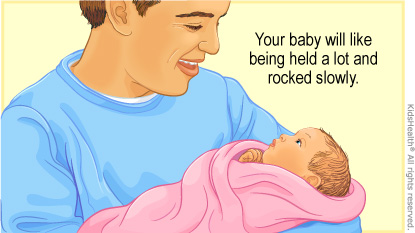Neonatal Abstinence Syndrome: How to Care for Your Baby
Neonatal abstinence syndrome (NAS) is when a baby has withdrawal from a medicine or drug the mom took while she was pregnant. One common type of NAS is called NOWS (neonatal opioid withdrawal syndrome). NOWS is when a baby has withdrawal specifically from an opioid drug. Your baby is ready to leave the hospital and doesn't need any further treatment. It can take a few weeks for all the medicine or drug to leave your baby's body. Follow these instructions to keep your baby comfortable at home.


-
Try to help your baby stay asleep for 3 or 4 hours in a row between feedings. Create a calm, quiet sleeping place. Keep the lights dim.
-
Feed your baby whenever they seem hungry. Your baby might find it soothing to use a pacifier between feedings.
-
Take care of your baby gently and calmly. Your baby will like being held a lot and rocked slowly.
-
If your baby keeps sucking on their fists, cover the fists with baby mittens. If the skin becomes raw, don't use lotion because the baby may swallow some of it.
-
If your baby sneezes a lot or has a stuffy nose, use a clean cloth to wipe mucus away from the edge of the nose.
-
If you notice trembling or shaking, swaddle your baby in a thin blanket. Hold your baby close to your body or gently rock and hum to your baby. Keep your baby in a quiet, darkened area until they've calmed down.
-
If your baby's crying becomes very stressful to you, don't shake your baby or cover their mouth to muffle the cries. Put your baby in a safe place like a crib or bassinet and go into another room to take a break.
-
If you are feeling overwhelmed, put your baby in a safe place and take a break. Or ask a friend or a family member to take over for a while.
-
Take your baby to a health care provider within 48 hours after going home (or according to the instructions you were given) to make sure your baby is doing well.

Your baby:
-
cries or is fussy for more than an hour and can't be soothed
-
feeds less often or has fewer wet diapers than usual
-
seems to have trouble breathing
-
has a fever over 100.4°F (38°C)
-
is too congested to nurse or take a bottle

Your baby:
If your baby struggles to breathe, turns blue, or is hard to awaken, call 911.

What if my baby has trouble feeding? Try to feed your baby smaller amounts and burp your baby more often. Feed your baby in a quiet area and keep the number of visitors down.
Can I breastfeed while my baby is going through withdrawal? Yes. If you breastfeed, make sure your baby's health care provider knows what medicines or drugs you are taking. Most of the time, it's still best to breastfeed if your care team says it's OK. But don't take any other medicines or drugs without asking the care team. Some medicines are very dangerous to babies, who can get small amounts from a mom's breast milk.
Why do babies have withdrawal? Some medicines and drugs are very addictive. They include opioids like heroin, Percocet, Vicodin, methadone, Subutex, or Suboxone. The body gets used to these medicines and drugs, so people who take them for a long period of time feel sick if they stop. This is called withdrawal. For babies, withdrawal happens at birth because the baby isn't getting the drug through the mom's body anymore.